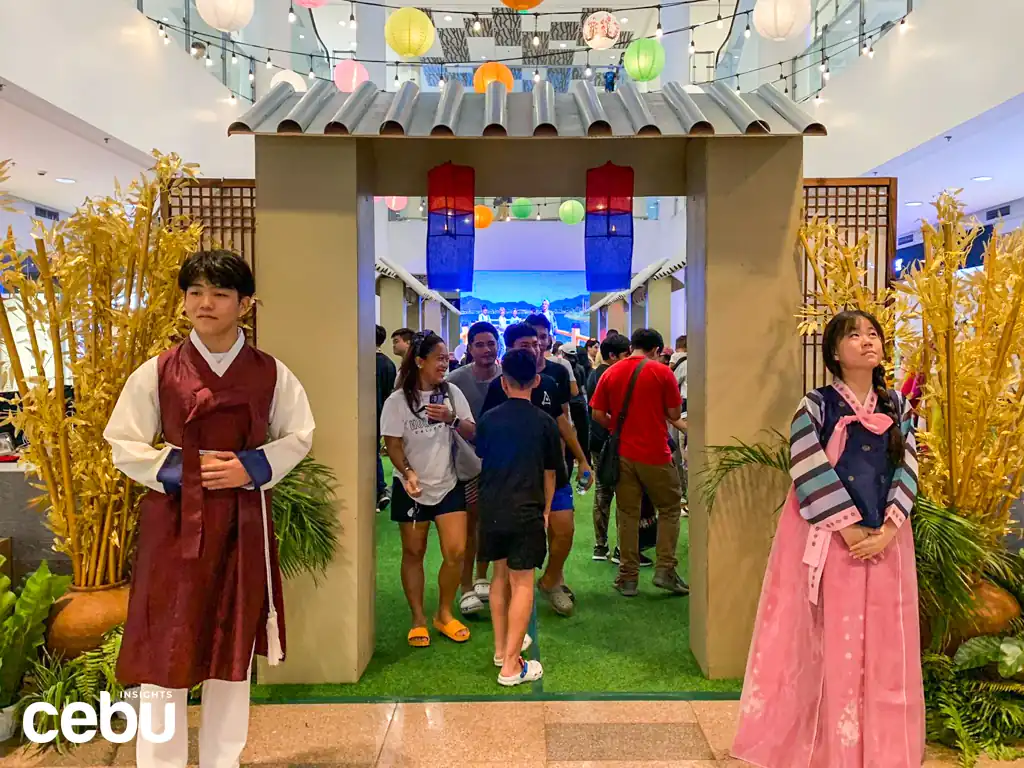Cebu had its 10th Korea Day celebration from October 6 to 8, 2023.
The Philippines has shared ties with Korea in terms of national relations, and the latter’s influence can be seen in various Filipino trends, such as food, music, and fashion.
Filipinos are heavy consumers of K-Pop and K-Drama, while Koreans enjoy vacationing in the Philippines because of the beaches, vibe, and hospitality.
Additionally, thousands of Filipinos have moved to Korea seeking greener pastures, while Koreans enroll at ESL schools in the Philippines to improve their English proficiency.
The event had several activities highlighting Korean culture and traditions.
This connection has been honored for many years.
Just recently, Cebu hosted its 10th Korea Day celebration from October 6 to 8, 2023, commemorating Korean culture and its influence on modern day Philippines.
The event was held at Ayala Center Cebu, with activities like the Cultural Exhibit and the Korean Food Festival highlighting several aspects of Korean culture and traditions.
The celebration’s main event was held at the Terraces featuring special performances, including one by an international K-Pop group.
The event was sponsored by the Cebu City government, with Cebu City Councilor Joy Pesquera and Acting Vice Mayor Donaldo Hontiveros present for the event.
Not only were Koreans in the Philippines more than welcome to attend the event, but officials from Korean organizations were also present. They gave speeches and welcomed both their countrymen and Cebuano mall goers.
10TH CEBU CITY KOREA DAY CULTURAL EXHIBIT
The Korea Day Cultural Exhibit was a great avenue to learn about Korean culture.
Korea Day gave visitors a crash course on important things to know about Korean culture.
The Cultural Exhibit, for instance, offered a glimpse of the country’s traditional fashion and other historical items.
The exhibit was held at the activity center near Zara and Rustan’s. Colorful lanterns hung from above to showcase how cultural festivals are held in other Asian countries.
Several exhibitors presented items featuring the Korean lifestyle. Dolls were on display, wearing the country’s traditional clothing called Hanbok.
Hanbok simply means “Korean clothes,” with the term used to differentiate Koreans’ everyday clothes with Westernized clothing. When the latter became the country’s preferred fashion, the Hanbok became a ceremonial attire made for formal events.
You will now see Koreans wear Hanbok at important events such as weddings, first birthdays, and funerals.
A pair of Danghye shoes was one of the exhibit’s more noticeable items.
This was a traditional women’s shoe worn by aristocrats during the Joseon Dynasty. These shoes had a fluffy cloth on the inside, and were made of silk-wrapped leather on the outside.
Some stalls also sold colorful bags and wallets that you can get as souvenirs from the event.
KOREAN FOOD FESTIVAL AND MAIN EVENT
At the Korean Food Festival, several stalls sold various Korean foods and snacks.
This was perfect for those who wanted to learn about Korean culture through their cuisine.
Many stalls served Korean barbecue like steaks and skewers, offering free samples to guests taking part in the event.
Other stalls offered more traditional delicacies like Tteokbokki and Bulgogi rice. Others provided packed lunches with dumplings and rice cakes.
Customers would sit by the tables near the main event, where various performances were put on.
The Korea Day main event presented a percussion instrument ensemble known as the Samulnori. This traditional Korean music style takes inspiration from Korean folk music, which is performed with acrobatic dance movements.
It consists of a quartet performing rhythmic patterns using four percussion instruments, namely the buk (barrel drum), janggu (hour-shaped drum), jing (gong), and kkwaenggwari (small gong).
Lastly, the event had a special guest for K-Pop fans in Cebu. Korean boy band Dustin graced the stage, performing some original hits as well as some fan-favorite tracks.
The five-man band flexed their dance moves, performing for the crowd that gathered at the Terraces. One of their highlights was their cover of the Korean version of MIC Drop, originally performed by world-renowned K-Pop group BTS.
This is one of the most popular K-Pop songs in the BTS discography, spawning a famous remix produced by award-winning music producer Steve Aoki.
Korea Day allowed Cebuanos to experience Korean culture without having to travel abroad. The exhibits showcased its rich history and traditions, while the main event and food festival showcased their talents and skills.
Events like this elevate relations between these two Asian nations to a higher standard, as both Filipinos and Koreans continue to show their love for one another for years to come.





















